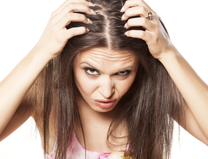5 Most Common Stressors that Cause Female Hair Loss

“Crowning Glory,” a word often used to denote a woman with beautiful, shiny, and healthy hair. The faces of many beautiful women flash in our minds when we hear these words. Then there is the fairy tale of Rapunzel, a whole romantic story spun around her unbelievably long tresses. Having voluminous hair is very important for women, it is a symbol of femininity and an asset they are proud of. All over the world, hundreds of large brands release thousands of hair care products for women just because they know how women fuss over their hair.
It is however heartbreaking for a woman when after slaving over taking care of her hair, she is still losing them a handful of strands a day. The stress can take a toll on her daily activities, her social life, and sometimes even her health. Receding hairline is often linked to men and is relatively rarer in women. However, the modern world comes with its own baggage of issues for women. There are an infinite number of stressors involved in a modern woman’s life and result in hair fall.
A normal head of hair is considered to have 1,20,000 to 1,50,000 strands of hair out of which 90% are always in the growing phase which is called the anagen phase that can last from two to three years. After the anagen stage, the hair follicle shrinks which takes 2-3 weeks and is called the catagen phase. The final stage is the resting phase which lasts for 3-4 months and is called the telogen phase after which the hair falls. Commonly people lose 50-100 strands of hair a day, and one can lose around 250 strands of hair on a day when they wash their hair. One can usually notice an abnormal loss of hair when there are too many hair strands left on the comb than normal, or if there is a noticeable amount of hair on the pillow when a person gets up in the morning, or overall thinning can be observed on the head and more scalp is visible than normal.
There are many reasons that can affect female hair loss and these are called stressors. A body can be affected by several stressors that can lead to physiological changes in the body. Any kind of physiological changes in the body can lead to hair loss. These stressors can be generalized as:
- Metabolic stressors: Nutrition defects like vitamin D deficiency, the excess of vitamin A, iron deficiency anemia, severe infection, etc.
- Hormonal Imbalance: Low estrogen level after childbirth, thyroid problem, PCOD, menopause, etc.
- Emotional Stressors: Going through a family crisis like divorce, loss of a family member, financial issues, or career problems can affect diet and sleep which can lead to physiological changes in the body leading to hair loss.
- Drug Induced: Being on certain medications like anticoagulants, anticonvulsants, antifungals, oral contraceptive pills, antidepressants, cholesterol medications, antihypertensive, etc. can lead to hair loss.
- Self-Induced: Going on and off medications like oral contraceptive pills, losing weight, going on a low-calorie diet, and tying hair very tightly for a long period of time can lead to traction alopecia.
These stressors can take 3 to 6 months to show their effect on the body. Hence a stressor triggered 6 months back can lead to female hair fall after 6 months or so.
Although there are a few over-the-counter medications and supplements that one can take, it is better to see a doctor at the earliest if you notice a significant amount of hair fall. Any underlying cause can be detected at the earliest and once the cause is treated the hair fall will come under control. If the hair fall is irreversible, the doctor can suggest hair transplant which is a minimally invasive procedure and the success rate is high.
As they say, prevention is better than cure, it is always better to modify your lifestyle, take care of the stressors at the earliest. Follow proper diet, and have regular sleep cycle to avoid female hair fall and protect your Crowning Glory.

